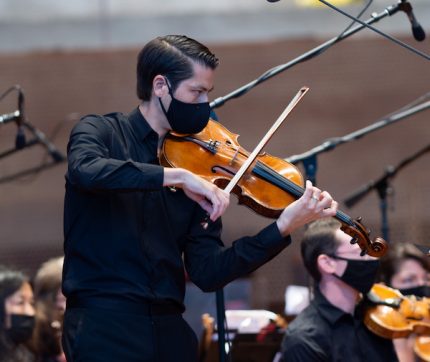Kalmar, Grant Park Orchestra hit their stride with Bernstein, Sibelius and Brouwer

This weekend’s program at the Grant Park Music Festival was to have featured the world premiere of The L.E.S. Characters by Jessie Montgomery, new composer in residence of the Chicago Symphony Orchestra. Unfortunately, the work’s debut has been delayed until next summer. (In a bit of serendipitous scheduling, Montgomery’s Banner was performed the same evening by the CSO at Ravinia.)
Happily, Grant Park’s revised program still featured the slated soloist Masumi Per Rostad, who instead performed Margaret Brouwer’s Viola Concerto Friday night at the Pritzker Pavilion.
A Michigan native, Brouwer served for over two decades as head of the composition department at the Cleveland Institute of Music. Though her music is rarely heard in Chicago, the prolific 80-year-old has built up a significant oeuvre, including a symphony, several orchestral works, dozens of chamber works and three concertos. Among the latter is the Viola Concerto, composed in 2010 and heard in its Chicago debut.
Cast in the traditional three movements, the opening section (“Caritas”) begins with a brief ominous statement by the orchestra. The soloist enters immediately afterward playing an agitated solo figure. A melodic secondary theme follows from the violist, which grows in ardency. Much of the longish movement alternates between this material—angular fragments set against lyrical passages, often with unusual scoring featuring bells and twittering avian winds. A traditional cadenza offers the violist a moment of pyrotechnical display as he surmounts the more jagged music. A new sweetly lyrical theme arises, played with expressive feeling by Rostad and emerging in sumptuous, silver-screen opulence in the orchestra. The chimes return and the violist muses inwardly in a passage backed by solo harp.
The second movement (“fair as the moon, bright as the sun”) offers a spring-like main theme, as the tempo quickens to another lyrical flowering and cadenza. The finale (“Blithesome spirit”) begins with sharp single notes by the violist, and again sets impassioned music and jagged fragments for the viola against brief echoes of the earlier lyrical moments, albeit here in a more formulaic vein.
Brouwer’s style is tonal and her melodic writing falls easily on the ear. There are inspired moments and it’s hard to resist the big, expansive tune at the end of the opening movement. Ultimately, the concerto doesn’t quite hang together convincingly and Brouwer fails to work out her interesting ideas in a musically compelling way. The finale is especially lacking in worthy musical material.
The concerto’s issues were no fault of the evening’s soloist, Masumi Per Rostad. Former longtime member of the Pacifica Quartet, the violist made the strongest possible case for this uneven score, playing with even burnished tone, bringing a ripely Romantic sensibility to the soaring pages and tackling all the difficulties with consummate technical ease. Kalmar and the orchestra were comparable partners, lending excellent and committed support.
After a somewhat uneven first two weeks, it was clear from the opening work Friday— the Three Dance Episodes from Leonard Bernstein’s On the Town—that Kalmar and the Grant Park Orchestra were hitting their stride this summer. The brass players were moved from the choral risers to the stage to join their colleagues, and the entire ensemble sounded more cohesive and blended, playing with customary fire and brilliance.
Kalmar led high-stepping performances of the outer dances and evoked a nice nocturnal melancholy in “Lonely Town.” The “Times Square: 1944” finale was especially vivid and richly characterized with personality-plus solos, including a sinuous clarinet and wonderfully sleazoid saxophone.
The music of Jean Sibelius—imbued with compelling drama and piney Northern evocation—is such a natural for al fresco concerts, it’s surprising that one doesn’t encounter it more often at summer festivals. This program remedied that by closing with the Finnish composer’s Symphony No. 5.
In many ways, the Fifth represents Sibelius at his peak with music that is austere yet darkly lyrical and elemental in its power. Unusually for him, Sibelius struggled with the work, revising many parts and eventually telescoping the original four movements into three. Yet the extended creative process is not apparent in music that seems to move with a seamless sense of inevitability in a hugely involving musical narrative.
The opening bars could have been more atmospheric and concentrated but after that Kalmar led a flowing, organic performance that brought out the restless drama of this music. This performance was especially fine in illuminating Sibelius’ singular scoring—as with the scurrying strings over a brooding solo bassoon. Intermittent light rain added a fourth-wall quality to the turbulent musical landscape unfolding onstage.
Kalmar and the GPO players nicely charted the slow movement’s shifting terrain—as the waltz-like main theme segues from the delicacy of string pizzicatos to a rich flowering, and eventual off-center unease as the motif spins out of control.
The finale felt like a work in progress Friday night with the sweeping horn theme strangely underpowered and/or under-miked, the horns almost inaudible at their first appearance. That apart, Kalmar led a subtly calibrated reading that in no way played to the gallery (or the lawn). The conductor built the tension steadily to the blazing final section and the six widely spaced chords sealed the performance with emphatic force and granitic weight.
The program will be repeated 6:30 p.m. Saturday. grantparkmusicfestival.com
Posted in Uncategorized

